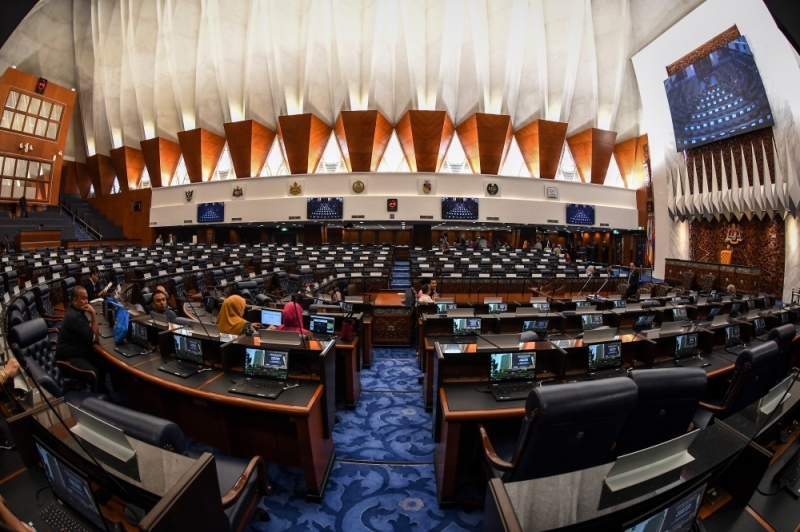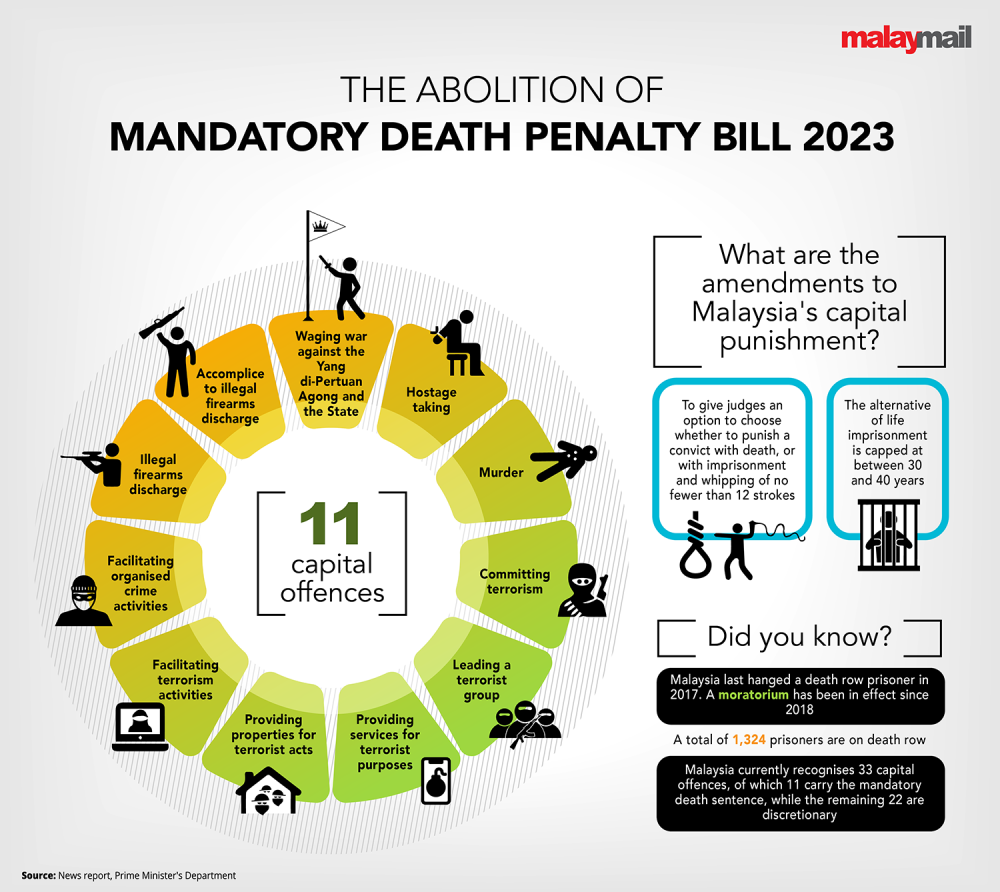Six months after abolition kicked in, Amnesty International says death penalty sentences fell but whipping used as alternative instead

The Dewan Rakyat passed the Bill proposing to make the death penalty an option and no longer mandatory after it was tabled for its third reading on April 3 last year. The Abolition of Mandatory Death Penalty Bill would give judges the discretion on the death penalty rather than requiring them to do so when convicting on offences that made them mandatory. — Bernama pic
Monday, 26 Feb 2024 9:04 PM MYT
KUALA LUMPUR, Feb 26 — Rights group Amnesty International (AI) Malaysia said today it recorded a significant decrease in death sentences here within six months after its abolition came into effect in July last year.
Ahead of the Dewan Rakyat sitting tomorrow, the watchdog said it however remains concerned that whipping has instead been used as an alternative punishment in addition to what it deemed as unfair trials.
“Based on Amnesty International’s monitoring of media reports and judicial decisions, during the first six months since the legislative reforms to repeal the mandatory death penalty came into force, 40 men out of 71 people (56 per cent) recorded to have escaped the death penalty were instead sentenced to terms of imprisonment and mandatory whipping.
“Most of these men (36) were sentenced to receive 12 strikes of the whip, three 15 strikes and one 18 strikes. The remaining 31 people — women or men above 50 years of age — only received sentences to terms of imprisonment,” it said.
It also highlighted systemic flaws which it said undermine the right to a fair trial for cases where one can be sentenced to the death penalty — including the right to competent and effective legal counsel from the start of a criminal investigation so they can prepare their defence.
“During the period under consideration, Amnesty International noted media reports relating to 50 people — Malaysian and foreign nationals — who appeared before magistrates’ courts to be charged with capital crimes.
“Of these, 28 people (56 per cent) were reported as represented, and a significant 20 individuals (40 per cent) as unrepresented (this information was unconfirmed for two other people), despite existing legal aid schemes established across Malaysia to support defendants of less advantaged socio-economic backgrounds,” it said.
This comes as it said there has been a decrease in death sentences after the Abolition of Mandatory Death Penalty Act 2023 came into effect — giving defendants the possibility of alternative punishments of imprisonment between 30 and 40 years and whipping, or having their existing death sentence commuted.
It said of 139 individuals in cases between July 4, 2023 and January 4 this year, 42 (28 per cent) had their charges amended to a lesser offence or were acquitted.
Of the remaining 97 cases, it said 26 cases (27 per cent) resulted in the death penalty being imposed or upheld, but a remarkable 71 cases (73 per cent) received the alternative punishment instead.
“The figures show that through the ordinary court process, the death penalty remained the preferred sentence for 26 out of 70 cases (37 per cent). Discretion appeared to be embraced in favour of non-death penalty sentences proportionally more by appellate courts.
“The death penalty was imposed in an alarming 44 per cent of recorded cases before the High Courts, whereas this percentage reduced to 21 per cent and 25 per cent before the Court of Appeal and Federal Court (ordinary jurisdiction), respectively. Significantly, the offence of murder correlated to a higher number of cases where the death penalty was imposed or upheld — 18 out of 26 cases (69 per cent).”
In response, it urged Putrajaya to continue the moratorium on mandatory death sentences established in 2018 until the death penalty is fully abolished and all death sentences are commuted.
“The forthcoming Parliamentary session — one year on from the adoption of landmark legislation on the abolition of the mandatory death penalty — must not be a missed opportunity to take stock and ensure that the protection of human rights is at the centre of the ongoing resentencing process,” it said.
The Dewan Rakyat passed the Bill proposing to make the death penalty an option and no longer mandatory after it was tabled for its third reading on April 3.
The Abolition of Mandatory Death Penalty Bill would give judges the discretion on the death penalty rather than requiring them to do so when convicting on offences that made them mandatory.
The amendments in the Bill also include replacing life and natural life imprisonment (until death) as an alternative to the mandatory death sentence, with the new alternative of jail of between 30 and 40 years as well as no fewer than 12 strokes of the cane.
The last death row prisoner was hanged in 2017 but because legislation carrying the mandatory death penalty has remained effective, the courts have been bound to continue sentencing defendants to death despite the moratorium on executions.

Read here for Malay Mail's explainer on the brief history of capital punishment and death row inmates in Malaysia.
Monday, 26 Feb 2024 9:04 PM MYT
KUALA LUMPUR, Feb 26 — Rights group Amnesty International (AI) Malaysia said today it recorded a significant decrease in death sentences here within six months after its abolition came into effect in July last year.
Ahead of the Dewan Rakyat sitting tomorrow, the watchdog said it however remains concerned that whipping has instead been used as an alternative punishment in addition to what it deemed as unfair trials.
“Based on Amnesty International’s monitoring of media reports and judicial decisions, during the first six months since the legislative reforms to repeal the mandatory death penalty came into force, 40 men out of 71 people (56 per cent) recorded to have escaped the death penalty were instead sentenced to terms of imprisonment and mandatory whipping.
“Most of these men (36) were sentenced to receive 12 strikes of the whip, three 15 strikes and one 18 strikes. The remaining 31 people — women or men above 50 years of age — only received sentences to terms of imprisonment,” it said.
It also highlighted systemic flaws which it said undermine the right to a fair trial for cases where one can be sentenced to the death penalty — including the right to competent and effective legal counsel from the start of a criminal investigation so they can prepare their defence.
“During the period under consideration, Amnesty International noted media reports relating to 50 people — Malaysian and foreign nationals — who appeared before magistrates’ courts to be charged with capital crimes.
“Of these, 28 people (56 per cent) were reported as represented, and a significant 20 individuals (40 per cent) as unrepresented (this information was unconfirmed for two other people), despite existing legal aid schemes established across Malaysia to support defendants of less advantaged socio-economic backgrounds,” it said.
This comes as it said there has been a decrease in death sentences after the Abolition of Mandatory Death Penalty Act 2023 came into effect — giving defendants the possibility of alternative punishments of imprisonment between 30 and 40 years and whipping, or having their existing death sentence commuted.
It said of 139 individuals in cases between July 4, 2023 and January 4 this year, 42 (28 per cent) had their charges amended to a lesser offence or were acquitted.
Of the remaining 97 cases, it said 26 cases (27 per cent) resulted in the death penalty being imposed or upheld, but a remarkable 71 cases (73 per cent) received the alternative punishment instead.
“The figures show that through the ordinary court process, the death penalty remained the preferred sentence for 26 out of 70 cases (37 per cent). Discretion appeared to be embraced in favour of non-death penalty sentences proportionally more by appellate courts.
“The death penalty was imposed in an alarming 44 per cent of recorded cases before the High Courts, whereas this percentage reduced to 21 per cent and 25 per cent before the Court of Appeal and Federal Court (ordinary jurisdiction), respectively. Significantly, the offence of murder correlated to a higher number of cases where the death penalty was imposed or upheld — 18 out of 26 cases (69 per cent).”
In response, it urged Putrajaya to continue the moratorium on mandatory death sentences established in 2018 until the death penalty is fully abolished and all death sentences are commuted.
“The forthcoming Parliamentary session — one year on from the adoption of landmark legislation on the abolition of the mandatory death penalty — must not be a missed opportunity to take stock and ensure that the protection of human rights is at the centre of the ongoing resentencing process,” it said.
The Dewan Rakyat passed the Bill proposing to make the death penalty an option and no longer mandatory after it was tabled for its third reading on April 3.
The Abolition of Mandatory Death Penalty Bill would give judges the discretion on the death penalty rather than requiring them to do so when convicting on offences that made them mandatory.
The amendments in the Bill also include replacing life and natural life imprisonment (until death) as an alternative to the mandatory death sentence, with the new alternative of jail of between 30 and 40 years as well as no fewer than 12 strokes of the cane.
The last death row prisoner was hanged in 2017 but because legislation carrying the mandatory death penalty has remained effective, the courts have been bound to continue sentencing defendants to death despite the moratorium on executions.

Read here for Malay Mail's explainer on the brief history of capital punishment and death row inmates in Malaysia.
No comments:
Post a Comment